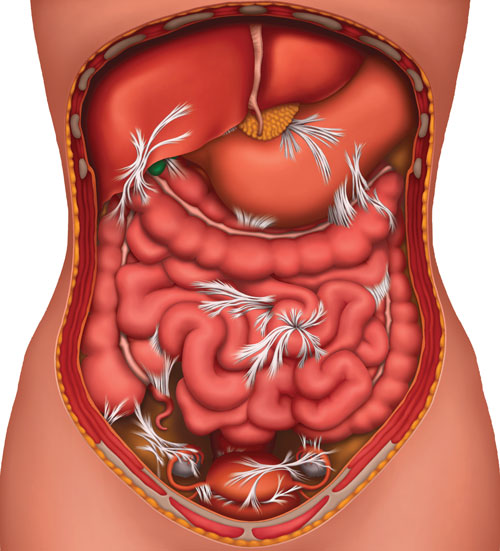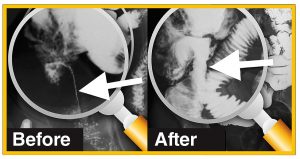What is the Cause?
The most common cause of bowel obstructions is adhesions. In fact, 65%-75% of bowel obstructions, are caused by adhesions. Adhesions are collagenous bands of scar tissue that form after some sort of trauma during the healing process. Think of it like a scab forming on your skin after a cut. Adhesions are internal “scabs” that assist in the healing of trauma, however, they can have serious side effects. These collagenous bands of scar tissue can wrap around your intestines and strangulate them, causing obstructions in the bowel. We usually use the metaphor of a hose that is being pinched shut. Adhesions can form following any type of trauma, for example, after infection, radiation therapy, or inflammation, and most commonly, they form after some type of surgery.

Other, more rare causes of bowel obstruction are hernias, Crohn’s Disease, malignancy, volvulus, and diverticulitis. Hernias can squeeze the bowel shut, making it difficult or impossible for contents to pass through the intestines. Crohn’s Disease is a chronic inflammatory bowel disease. These persistent inflammations lead to scarring and inevitably, the formation of adhesions through the never-ending inflammation of the delicate tissues. Malignancy, the presence of a tumor, can obstruct the intestine, causing blockage. Volvulus is an obstruction that occurs from the intestine being twisted or knotted. Diverticulitis is fairly similar to Crohn’s, an inflammation or infection in the digestive tract that can cause scar tissue (adhesions), and constipation.
Symptoms of a Small Bowel Obstruction
- Nausea and vomiting
- Constipation and inability to pass gas
- Abdominal distention, which can be confused with bloating
- Fever
- Tachycardia (higher than normal resting heart rate)
- Loss of appetite
- Recurring or extreme abdominal pain
If you are experiencing several of these symptoms it is important to notify your doctor. A bowel obstruction can be a life-threatening condition.




Here you can see adhesions forming in different areas of the intestine, leading to a bowel obstruction
How Do You Treat A Small Bowel Obstruction?
When a bowel obstruction occurs, doctors and physicians generally turn to surgery as the first option. But is it the best? What are the risks of surgery? Do you have options that are better suited for you? Below we will discuss the risks and recovery of bowel obstruction surgery as well as other treatment options that are less known in the medical field.
Surgery

As written above, doctors generally turn to surgery as the “cure-all” for bowel obstructions. While this surgery is life-saving, it does come with some associated risks and validated concerns from patients. We now know that 65-75% of bowel obstructions are caused by internal adhesions. We also know that an internal trauma such as a major abdominal surgery will cause more adhesions. In fact, 90% of patients who undergo a major abdominal surgery develop adhesions. It seems somewhat counter-intuitive that you would undergo surgery to treat adhesions causing your bowel obstruction, with a 90% chance of forming even more adhesions that will lead to another bowel obstruction following your surgery. It is important to note that surgery may be required in order to remove infected or necrotic (dead) tissue or to repair perforations to the bowel.
Risks Associated with Surgery/Side Effects of Surgery
- 7-day hospital stay recovery
- Risk of developing more adhesions (scar tissue), leading to future bowel obstructions
- Potential abdominal bleeding
- Potential of damaging other internal organs
- Repeat surgeries
Manual Physical Therapy (Clear Passage®️ Treatment)

There’s a much less known treatment for bowel obstructions, that involves no surgery, drugs, or medications to eliminate small bowel obstructions and assist you in gaining your life back after struggling with recurring bowel obstructions. For over two decades, Clear Passage has been extremely successful in clearing bowel strictures by treating the root cause–adhesions–naturally. The Clear Passage ® Treatment uses a hands-on approach by gently breaking apart the adhesions restricting your intestines over a 20-hour treatment course and educating you on how you can treat yourself after therapy. View our published studies and success rates in treating bowel obstructions here.
Risks Associated with Physical Therapy/Side Effects of Surgery
For most patients, side effects from this treatment have been transient and minimal, such as temporary minor soreness of the treated areas, soreness in other areas of the body following treatment, possible spotting for women after internal treatment, and fatigue.
Small Bowel Obstruction Prevention Options
- Drink plenty of fluids: Drinking more water will help food move more easily through your digestive tract.
- Chew your food thoroughly: Chewing your food thoroughly will decrease the amount of work your digestive tract must do, and help to prevent intestinal obstructions.
- Diet Change: Changing your diet to be more digestive health-friendly, may help prevent future small bowel obstructions. Read through our Digestive Health Guide for Bowel Obstructions to learn more.
- Take note: Many of our patients have found it very helpful to keep a food journal. Learn what agrees with your stomach and what triggers your issues. Many people find it helpful to slowly reintroduce foods into their diet to make sure they can pinpoint what is causing the issue.
Related Content:
Research and Success Rates
- Study Results for a Non-Surgical Bowel Obstruction Treatment
- Study Results for a Non-Surgical Bowel Obstruction Treatment
- Bowel Obstruction Success Rates
Questions Answered
- Recurring Small Bowel Obstruction Treatment Frequently Asked Questions
- The Most Common Causes of Bowel Obstruction and How to Prevent It
- Bowel Blockage Symptoms
- How to Prevent Bowel Obstruction
- Can Diverticulitis Cause Bowel Obstruction?
- Seven Signs of Intestinal Blockage
- What to know before accepting an IBS Diagnosis
- How Long Does a Bowel Obstruction Last?
- What is the Cause of a Small Bowel Obstruction and What Are Your Options for Treatment?
- How Will My Lifestyle Change with Small Bowel Obstructions?
- Is There a Natural Treatment for Small Bowel Obstruction?
- What SBO Patients Can Expect From Treatment
Treatment
- At a Glance: Bowel Obstruction
- Bowel Obstruction
- Bowel Obstruction – Need Help Now?
- Bowel Obstruction Treatment
- [Infographic] The Main Causes of Bowel Obstructions
Patient’s Stories
- Bowel Obstruction: Patient Story Update
- Video Testimonial – A Mother’s Journey to Recovery: Small Bowel Obstruction
- What Is Bowel Obstruction? – A Patient’s Perspective
- A Glimpse into a Brave Young Boy’s Journey with CHARGE Syndrome
- Success Story: Clear Passage Allowed Me to Resume My Adventures
- Emergency Small Bowel Obstruction Surgery in India
- An End to Bowel Obstructions
Diet
- How to Relieve a Bowel Obstruction: Diet Guide
- Recipes For Bowel Obstruction Patients
- Diet Guide for Avoiding Bowel Obstruction
- Diet Modifications to Help You Handle a Small Bowel Obstruction
- Digestive Health Guide
- Bowel Obstruction: Diet & Lifestyle Recommendations
- Minimal Fiber Diet for Digestive Disorders
- Nutritional Guidelines
- Transitioning to a Regular Diet from a Low or Minimal Fiber Diet
- Low Fiber Diet for Digestive Disorders
Bowel Obstruction | SBO | SIBO


